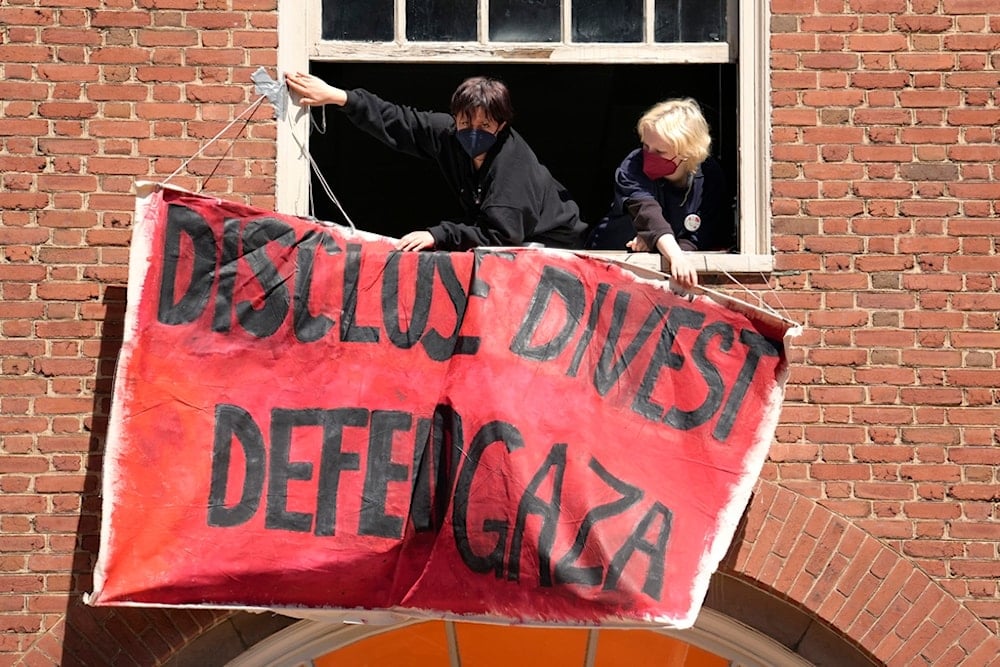Norway top trade union backs full boycott, divestment from 'Israel'
Norway’s largest labor union votes to boycott "Israel" and calls on the country's $1.8 trillion wealth fund to divest from companies complicit in the occupation and the war on Gaza.
-

Activists hang a placard from a window of an upper floor of a building at Rhode Island School of Design, Tuesday, May 7, 2024, in Providence, Rhode Island, the United States (AP)
The Norwegian Confederation of Trade Unions (LO), the country’s largest and most influential labor organization, has voted in favor of a sweeping economic boycott targeting the Israeli occupation, marking one of the most decisive labor-led actions in Europe in solidarity with the Palestinian cause.
The decision, adopted with a resounding 88% majority, was finalized during LO’s national congress in Oslo, held between May 8 and 9. The resolution commits the union to a full economic boycott of "Israel", including a ban on trade and investment with companies connected to the occupation.
The Palestine Committee of Norway confirmed the outcome, noting that 240 delegates supported the measure, while 69 voted against it.
The newly adopted policy obligates LO to pressure major financial institutions, including Norway’s sovereign wealth fund, the State Pension Fund Global, to withdraw from any investments in companies that contribute to or profit from the occupation of Palestinian land. Norwegian firms and banks are also expected to divest from such entities under the new directive.
“This resolution sends a clear message,” stated the Palestine Committee. “LO now expects the State Pension Fund, Norwegian companies, and financial institutions to pull out of companies complicit in the Israeli occupation.” With more than one million members, LO’s position reflects broad support within Norwegian labor for the global Boycott, Divestment, and Sanctions (BDS) movement.
Palestinian factions applaud the vote
Palestinian resistance movements welcomed LO’s move as a principled stand against the Israeli regime. In a statement, Hamas praised the decision as a “courageous step that aligns with truth and justice and a victory for the rights of the Palestinian people.” The group called on trade unions worldwide to emulate Norway’s example by isolating what it described as a “fascist entity” and exposing its crimes.
The Democratic Front for the Liberation of Palestine (DFLP) also expressed support for the resolution, urging pension funds and global companies to cut financial ties with firms operating in or profiting from the occupation.
Meanwhile, the Popular Front for the Liberation of Palestine (PFLP) described the decision as a reflection of the Israeli regime’s growing international isolation following what it called genocidal acts in Gaza and the West Bank.
Focus on Norway’s $1.8 trillion wealth fund
LO’s decision also places mounting pressure on Norway’s $1.8 trillion sovereign wealth fund, the largest of its kind in the world. Reuters reported that LO, which is politically aligned with the governing Labor Party, holds significant influence in public policy and has previously championed ethical investment practices.
Steinar Krogstad, LO’s deputy leader, told the news agency that the fund should not be involved with any company that violates international law, particularly in the occupied Palestinian territories.
In April, LO joined 47 civil society groups in sending a formal letter to Finance Minister Jens Stoltenberg, urging him to direct the central bank, responsible for overseeing the wealth fund, to initiate divestment procedures, including from the Tel Aviv Stock Exchange.
According to the latest figures cited by Reuters, Norway’s wealth fund held investments worth approximately 22 billion Norwegian crowns (around $2.12 billion) in 65 Israeli companies by the end of 2024. While this represents just 0.1% of the fund’s overall holdings, campaigners argue that even minor stakes in firms implicated in the occupation or war crimes should be viewed as unacceptable.
LO’s resolution is expected to reverberate across Europe’s labor landscape and could embolden similar initiatives in other countries. It also reinforces growing calls from human rights organizations for institutions to reevaluate their ties with companies operating in or profiting from the occupation, particularly amid "Israel’s" ongoing war on Gaza.

 4 Min Read
4 Min Read








